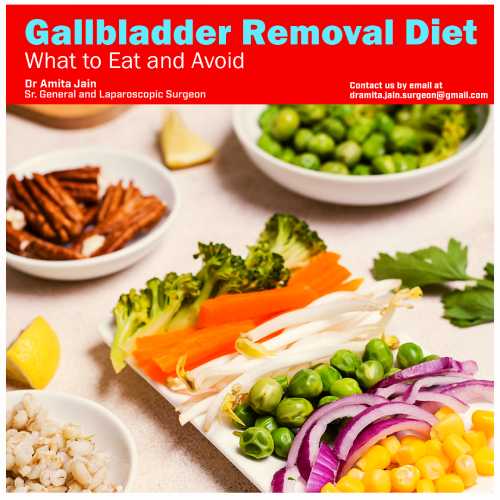Amid the hustle and bustle of our daily lives, it’s easy to overlook the importance of maintaining a balanced diet for our well-being. However, there are instances where we simply cannot afford to disregard dietary considerations. Take, for instance, cholecystectomy which is when your gall bladder is removed surgically.
This pear-shaped organ that resides below your liver stores bile produced by the liver which helps in the digestion and absorption of fats. In its absence, there is no organ to concentrate or control the bile. So, the bile now flows directly into the intestines. This makes it harder for the body to digest fatty and greasy foods, which can cause discomfort like pain, gas, bloating, and diarrhoea.
While laparoscopic surgery for cholecystectomy (gallbladder removal) is minimally invasive and typically allows for quicker recovery compared to traditional open surgery, patients still need to be cautious about their diet post-surgery. Since the gallbladder is responsible for storing and releasing bile to aid in digestion, its removal can affect how the body processes certain foods, particularly those high in fat. That’s why it is important to follow your doctor’s advice on what to eat and what not to eat after cholecystectomy.
Let’s find out about the right diet from Delhi’s top laparoscopic surgeon for gallbladder Dr Amita Jain.
What to eat after gallbladder removal surgery?
Hydration is key – It is extremely important to keep yourself well-hydrated after cholecystectomy to replenish the fluids that are lost due to diarrhoea. Drink plenty of fluids such as water, herbal teas like chamomile or ginger, diluted fruit juices, vegetable juices, and clear broths.
Avoid alcohol for at least two days post-surgery, especially if you’re still feeling the effects of anaesthesia or pain medication. Go easy with sugary and high-fat drinks to avoid gastrointestinal discomfort. Keeping well-hydrated also helps flush bacteria from your urinary tract, aiding in overall recovery.
A fibre-rich diet – After gallbladder removal, your body needs more fibre to help in bowel movements which makes digestion simpler. The soluble fibre in oats, barley, black beans, and chickpeas helps absorb water, making stools softer and reducing diarrhoea risk. Insoluble fibre from wheat bran, lentils, and veggies like spinach and carrots adds bulk to waste. Increase your fibre intake slowly over the weeks to avoid gas or bloating.
- Lean Protein Foods
- Choose chicken or turkey without skin.
- Salmon, tuna, trout, tilapia, etc are good options in fish and seafood.
- Plant proteins – Tofu, tempeh, beans, lentils, edamame
- Low fat diary like Greek youghurt or cottage cheese are great options
- Egg-whites
What not to eat after gallbladder removal surgery?
Processed Foods – Avoid processed foods as they contain a lot of fat and sugar which become difficult to digest, especially after cholecystectomy. Stay away from cookies and cakes, pastries and pizzas, sausages and bacon, etc.
Say NO to Spicy Foods – Capsaicin, the active ingredient found in hot peppers can irritate your stomach lining and can cause stomach pain, nausea, vomiting, and diarrhoea.
Avoid Hard Drinks – On removal of the gall bladder, your digestive system undergoes structural changes that may cause small intestinal bacterial overgrowth (SIBO), symptoms of which are bloating, stomach pain, nausea, and constipation. Thus it is advised to avoid hard drinks at least for the first couple of weeks.
Fatty Meat – Avoid steak or high-fat cuts of red meat, beef, whole or ground, lunch meats, such as bologna and salami, fatty cuts of beef, such as T-bone and rib-eye steak, etc as in the absence of the gall bladder, these saturated animal fats are difficult to break down thereby causing digestive discomfort.
Full-Fat Dairy Products – In the absence of the gall bladder, it will be difficult to digest high-fat dairy products like whole milk, ice cream, butter, and soft, creamy cheeses.
It is always better to consult your doctor for personalized dietary advice after cholecystectomy. Focus on good hydration, add high-fibre foods, and lean proteins to your diet while avoiding processed foods, spicy dishes, alcohol, fatty meats, and full-fat dairy to support your recovery effectively.

Dr Amita Jain is a surgeon with the highest degree of professional competence, precision and surgical craftsmanship. Performed all complicated general surgery procedures with in depth knowledge of invasive and few minimal invasive and onco surgical techniques. Underwent special training in trauma, executed various trauma-related complex life-saving neurosurgical procedures, reconstructed injured mangled limbs and performed vascular and reconstructive procedures with critical care.
Dr Amita Jain holds 28 plus years of rich experience in Trauma and General Laparoscopic Surgeries (including Gallbladder stone removal, appendix removal, hernia repair surgery, piles and fissure surgeries). She was the Professor Surgery of at the Army College of Medical Sciences and Base Hospital Delhi Cantt. In 1994 she was commissioned as Surgeon under the United Nations Mission in Congo. From 2020 to 2022, she worked with Bansals Hospital. Currently, Dr Amita Jain is the Sr. General and Laparoscopic Surgeon at Rainbow Children Hospitals, Malviya Nagar, Delhi.
Or Call Us at +(91) 882-6615301

